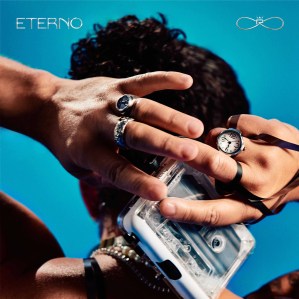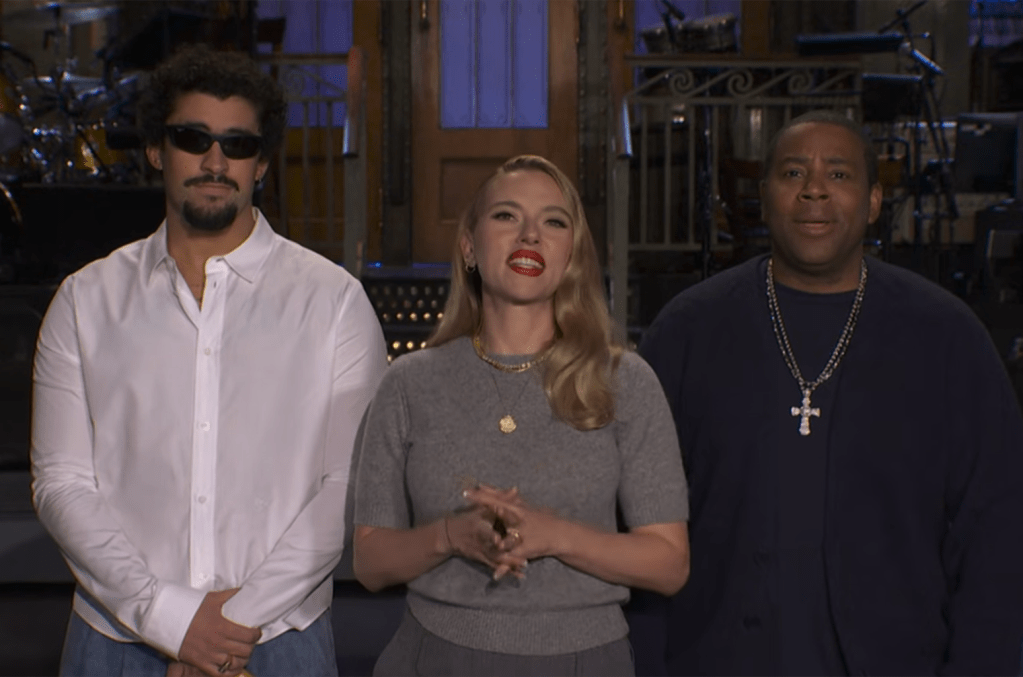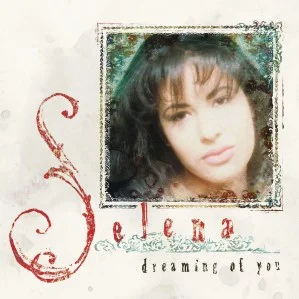Latin
Page: 23
After surprising her audience in Charlotte, N.C. with special guests Alejandro Sanz and Wyclef Jean earlier this week, Shakira brought another star to the stage on Thursday (May 15), on her first of two nights at the MetLife Stadium in East Rutherford, NJ. Explore See latest videos, charts and news See latest videos, charts and […]
Bad Bunny is ready to take summer by storm, but first, he’s performing as the musical guest during the season finale of Saturday Night Live this weekend. In promos for the May 17 finale of season 50 shared on Thursday (May 15), the superstar appears alongside host Scarlett Johansson and SNL mainstay Kenan Thompson, with […]

Fifteen years after achieving his first top 10 on Hot Latin Songs and his first No. 1 on Tropical Airplay with his take of “Stand by Me,” Prince Royce gifts his fans an entire album filled with pop classics in bilingual versions (English/Spanish) and bachata rhythms.
Titled ETERNO, the 13-track LP will be released Friday (May 16) under Sony Music Latin. It includes everything from “Dancing in the Moonlight” by King Harvest and “How Deep is Your Love” by the Bee Gees to “I Just Called to Say I Love You” by Stevie Wonder and “Go Your Own Way” by Fleetwood Mac, with “I Want It That Way” by the Backstreet Boys as the focus track. All the Spanish lyrics were written by Royce himself.
“For me, these are songs that are eternal, iconic, legendary,” the Latin star tells Billboard Español. “The intention with the album was somewhat similar to ‘Stand by Me.’ I wanted to bring back that nostalgia from a time when there was no Auto-Tune, when everything was raw, very real, into today’s world.”
Trending on Billboard
With a tracklist that also includes “Stuck on You” (Lionel Richie), “Right Here Waiting” (Richard Marx), “Can’t Help Falling in Love” (Elvis Presley), and “Yesterday” (The Beatles), Royce says it took his team about nine months to secure all the rights.
“When I was seeing that a song was going to go in, I was already like, ‘Okay, it fits in bachata,’” he explains about the selection process. “For me, the important thing was that the songs worked well in bachata, that the Spanish was good, that it flowed with the genre. Also I didn’t wanna force songs — it was important to keep the Prince Royce essence while also respecting the original song.”
Among the classics he felt were essential for this album, he mentions “Dancing in the Moonlight” as a song with a “positive vibe” that had always reminded him of bachata; “Can’t Help Falling in Love” as a perfect “wedding song” that was somewhat difficult to adapt; “My Girl” by The Temptations as an iconic “doo-wop” he wanted to tackle even though it reminded him of his previous hit “Stand by Me”; and “Stuck on You” by Lionel Richie, one of his personal favorites.
ETERNO follows Prince Royce’s 2024 album Llamada Perdida, a deeply personal set that included several heartbreak songs. This new project was very different, and Royce says he had fun learning and researching the original artists and embracing the challenge of adapting himself to their songs.
“It was just like a fun, music-geek project. I ended up really enjoying it and really like dissecting each harmony and background vocal and recording it,” he says enthusiastically. “I’d like for people who know these songs to bring those memories back, and maybe the younger generation in Latin America who doesn’t know them creates new memories. I hope we can achieve that.”
Prince Royce ‘ETERNO’
Courtesy Photo
History was made in Latin music when two Spanish-language albums hit No. 1 and No. 2 at the same time on the Billboard 200 albums chart this week. Both Bad Bunny’s Debí Tirar Más Fotos and Fuerza Regida’s 111XPANTIA occupied the spots, making it a first in the all-genre chart’s 69-year history. The Puerto Rican […]
Yeri Mua, the Mexican influencer who became TikTok’s No. 1 most-viewed musical artist globally in 2024, officially releases her debut album under Sony Music México, De Chava, tonight (May 15).
“It’s an album that totally captures my essence, who I am as a person,” the 23-year-old artist tells Billboard Español. “I’m not that grown-up, I’m young, but I’m at that stage in life where you start to understand many things — even though I never stop having fun, enjoying myself and falling in love. Literally, it’s about chava (girl) things.”
The 15-track set — which includes previously released singles like “Traka,” “Croketita” with La Lokera, “Avión Privado” with El Malilla, “Él No Es Tuyo” with Bellakath and Uzielito Mix, and “Modo Antidepresivo” alongside Snow The Product — arrives with the focus track “Morrita (Tinker Bell),” a song featuring Chilean artist Lewis Somes, in which she sings to an ex that he’s already lost her, and that he doesn’t have a brain.
Trending on Billboard
Produced (among others) by SAAK, Uzielito Mix and Jocsan La Loquera, it also includes collabs with La Joaqui (“Salida de Chicas”), Chris Tales (“Viña Mari”), and Marcianeke (“Combi”) — all with very colloquial and explicit language.
Yeri Mua signed with Sony Music México in mid-2024, when she was already amassing more than 600 million streams of her solo music and collaborations, according to a statement issued by the label at the time. From giving beauty tips and undergoing a remarkable physical transformation to becoming one of the top “reggaetón Mexa” performers, she is now entering a new phase in her rising career as a singer.
“I feel very proud of what I’ve achieved so far, much more confident than ever — and above all, deeply in love with what I’ve created with Sony Music — so, I’m ready for whatever comes next,” she says in her signature carefree style.
After a series of performances in the U.S. and Costa Rica, Yeri Mua is preparing for an important milestone in her career: her first solo concert in Mexico City, scheduled for May 30 at the Pepsi Center. She will then take her Traka Tour to other Latin American countries, including Argentina, Colombia, Chile and Guatemala.
But today, as De Chava is being released, she reflects on her beginnings, opens up about her fears, and looks forward to the future.
As an influencer, you were used to everything happening quickly. The process of building a career as a singer is different. How have you handled that?
I’m not going to lie, it’s been a very long process — because, obviously, things happen along the way. I even questioned myself about whether I really wanted this, and I lost a bit of motivation. But ultimately, here I am, happy.
How do you feel after transitioning from influencer to singer?
It was difficult, because now I have to earn people’s respect as an artist. Sometimes I even felt embarrassed to say I was a singer — but I am, and I’ve learned to believe in myself and trust in my ability to make this work. If I didn’t, I wouldn’t be here facing this head-on. I haven’t stopped being who I was — in fact, the album talks a lot about beauty, wanting to look spectacular, the things I enjoy doing, and what I love. I think many people can relate to my songs, regardless of their age.
I’m aware of my privilege, and I think there’s nothing wrong with that. Obviously, an influencer lives much more comfortably than most ordinary people who earn a minimum wage and work long hours. Yes, it’s a privilege to dedicate yourself to social media, but it’s not easy — it’s taken me a lot of effort to get to where I am; I’ve worked hard for this. I worked other jobs before becoming an influencer. Being an influencer was like a period of preparation for what God had planned for me.
Now as a singer, what’s your opinion about this profession?
My dreams have materialized, and it’s largely thanks to my team. An artist can’t achieve something like this alone, so I’m grateful and happy to have them.
There have been restrictions in many Mexican states on narcocorrido singers because of the lyrics. Are you prepared if this happens with reggaetón?
I think it was somewhat logical that this would happen with regional Mexican music because of words connected to drug trafficking. As for reggaetón, I don’t think explicit words will be censored. They might make some people uncomfortable, but they don’t offend or harm anyone.
Your upcoming Latin American tour is another big step forward in your music career.
I did very well on the tour I did in the United States, as well as in Costa Rica. Now it’s time to visit my fans in several countries, and I want to thank them for their support — so I’m going to give it my all.
During the premiere of Tomorrow Was Beautiful — in which Karol G highlights the impact of Selena Quintanilla on her own career — the Colombian artist was surprised with top-secret news from Netflix. The cat is now out of the bag, as it has been officially announced that a new Selena documentary is coming to […]

Shakira fans commuting from the TriState Area to her concerts at MetLife Stadium on Thursday and Friday (May 15-16) may need to rethink their travel plans. NJ Transit announced on Monday (May 12) it will be halting rail and bus service to the stadium for both shows. “Due to the potential rail service stoppage, NJ […]
The “She Wolf” is on the prowl again. Global superstar Shakira performed to a sold-out crowd at the Bank of America Stadium in Charlotte, N.C., on Tuesday (May 13), kicking off the U.S. leg of her successful Las Mujeres Ya No Lloran World Tour. As the tour slogan suggests, “women don’t cry,” they dominate stadiums! […]
El Alfa is hitting the road this year for the last time in his two-decade career. On Tuesday (May 13), the Dominican artist announced his farewell tour, El Último Baile, with 34 confirmed dates. The “King of Dembow,” known for hits such as “La Mamá de la Mamá,” “La Romana” and “Singapur,” will kick off […]
Noreh has stamped some of his most personal experiences on A Film By La Vida Real, his sophomore studio album and debut set under 5020 Records after signing with the label last September.
Explore
Explore
See latest videos, charts and news
See latest videos, charts and news
Home to 15 tracks, including the previously-released singles “Trailer,” “Dieta,” and “Rey” in collaboration with LAGOS, the Venezuelan singer-songwriter delivers primarily ballads (some laced with tropical music, others with electronic) that are both heartfelt and heart-wrenching—all best representing everything he’s lived in his 27 years.
“There are many varied experiences on this album, from good and bad things that have happened to me,” he tells Billboard exclusively. “I always believe that a piece of material should have that contrast and be honest enough to resonate with the people who listen to it. I had this concept of taking it through movies and TV shows because I felt it was necessary for each song to tell a story.”
Trending on Billboard
A Film By La Vida Real also includes collaborations with Corina Smith, Jay Wheeler, and Sin Bandera on the focus track “Porsi.” It also marked the first time that the 2025 Billboard Latin Artist to Watch teamed up with different composers for a project (he always wrote the songs himself).
“They made the creative process truly valuable,” he explains about his collaborators. “It was very enjoyable, very relaxed, we had a good time, and we ended up releasing these songs. Working with talented people allows everyone to contribute — they contributed with their essence, their voice, and their creativity.”
But beyond unleashing an album that is reflective, emotional, sensual, and mesmerizing, Noreh owes his potent lyricism to his identity.
“Everything starts from there,” he elaborates. “We always talk about the organic. How cool would it be to experience virality with some of the album’s songs, but we also know there’s something organic going on. I don’t downplay the value of an artist who generates virality or makes urban music. I love urban, underground, and explicit music, but I feel that everyone, based on their identity, needs to choose their niche and contribute to that. There are many people who dedicate themselves to making art.”
Below, Noreh breaks down three ultra-personal tracks on A Film By La Vida Real:
“Chao Cheo”: “It’s a love story, but the most curious thing is where it comes from and why. Basically, many years ago, I didn’t know about the person who killed my father, his life, or why he did what he did. The story is based on him and his wife. My way of expressing myself was this, and interpreting the fact that many families suffered because of this.”
“Niño”: “It’s very personal and speaks to that little child we all have inside, giving us strength and advice. I was interested in [creating a song with] this topic from the very beginning, and I had never explored it before until now.”
“Porsi” with Sin Bandera: “It’s a song that doesn’t talk about perfect love, but about a love that can fail at any moment. Just in case, this song is for you today, at 27 years old. Many songs talk about eternal and perfect love, but sometimes they don’t talk about the difficult things, and that’s precisely what I’m singing about.”

 State Champ Radio
State Champ Radio 







